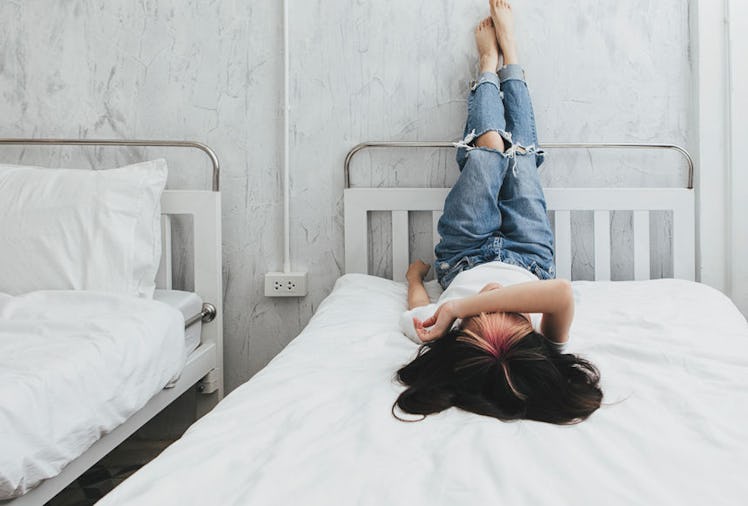
Here's What Sleep Experts Want You To Know If You Wake Up In The Middle Of The Night
When I first adopted my kitten, he had a terrible habit of waking me up at about 3 a.m. every single night (morning?) by licking my eyelashes — yes, he's a weird little guy who loves attention. After a few days of this, I thought I was going to go bananas due to the lack of sleep. But besides the obvious threat to your sanity, is waking up in the middle of the night bad for you? According to experts, it's pretty normal — that is, unless you can't fall back to sleep.
According to Dr. Sujay Kansagra, director of Duke University’s Pediatric Neurology Sleep Medicine Program and a sleep health expert at Mattress Firm, waking up in the middle of the night, in and of itself, isn't something to be concerned over. In fact, he says, your body's probably doing it for a good reason: to receive more circulation. "Waking up is not an abnormal part of sleep. In our light stages, as we begin to become restless and shift positions, we are actually protecting ourselves," he tells Elite Daily over email.
Besides promoting circulation, another common reason why your snoozing might be interrupted is because you have to get up and go to the bathroom. According to Bill Fish, a certified sleep science coach and co-founder of Tuck Sleep, "almost 50 percent of adult Americans get up to use the restroom at least once overnight." Since it takes roughly 90 to 120 minutes for your body to go through one full sleep cycle, he tells Elite Daily, if that time is interrupted, you're essentially forced to start that cycle over.
Your bedtime date with a package of Oreos, while absolutely delicious, could also be hurting your sleep.
"A common bedtime mistake people make is eating snacks that are primarily processed carbs, like cereal or crackers," Chris Brantner, sleep science coach and founder of SleepZoo, tells Elite Daily. Instead, he recommends, reach for a creamy, warm glass of milk to lull you to sleep.
But don't let yourself go to sleep too hungry, warns sleep expert Jacob Teitelbaum, MD, author of the book From Fatigued to Fantastic. He tells Elite Daily that a nighttime drop in blood sugar can cause you to wake up, and may even lead to night sweats. Try eating a snack that's rich in protein, he suggests, to make sure you don't get a case of the nighttime hangrys.
But when should you be worried that you have a problem?
According to Martin Reed, a certified health education specialist and founder of Insomnia Coach, there are a few tell-tale signs that'll let you know your sleep schedule just isn't working for you. If you wake with a gasp, a headache, dry mouth or throat, or your partner tells you that you snore loudly throughout the night, Reed tells Elite Daily, it's recommended that you talk to your doctor about whether you might have sleep apnea.
Overall, the worst thing you can do when you wake up in the middle of the night, says Dr. Benjamin Smarr, a Reverie sleep advisory board member and National Institutes of Health postdoctoral fellow at UC Berkeley, is let yourself be anxious about not being able to fall back to sleep. Excessive worrying about whether you're going to wake up during the night will actually make it that much harder for you to get your beauty rest, he explains.
"Distract yourself so you’re not an anxiety ball," he tells Elite Daily over email. "When the adrenaline runs its course while you’re too distracted to care, then sleeping will suddenly be much easier." His recommendation? Watching some lighthearted Netflix. So no, The Handmaid's Tale probably doesn't count, but I'd say The Office is a safe bet.
Another way to reduce bedtime stress, whether it's about sleeping soundly throughout the night or anything else that has you feeling anxious, is to bring a little self-care pampering into the bedroom. Elizabeth Trattner, a Chinese and integrative medicine expert, recommends keeping a pot of sweet-smelling, thickly textured moisturizing cream by your bed. "Before you turn off the light," she tells Elite Daily, "give your feet a good three-minute massage. This stimulates the production of oxytocin, a hormone that helps us relax and lowers cortisol."
Now excuse me while I marathon The Office — you know, to "help me sleep."